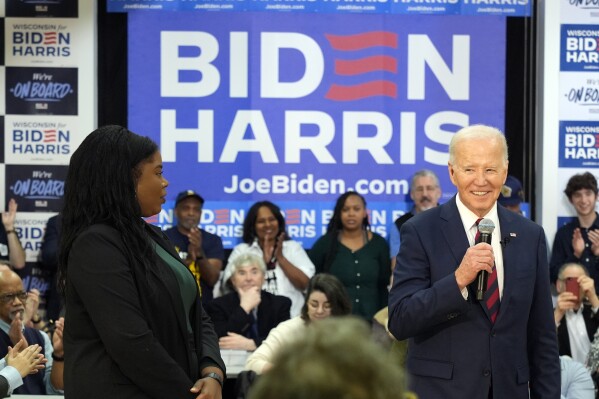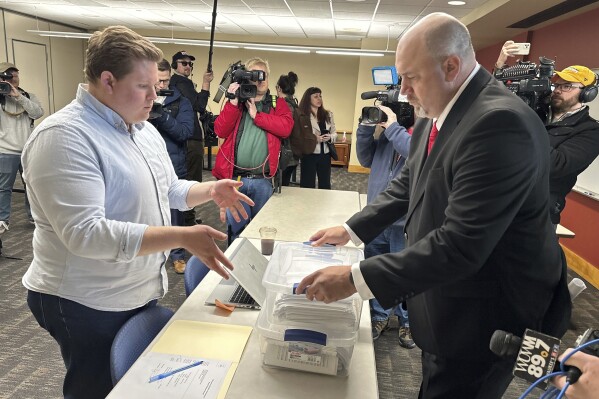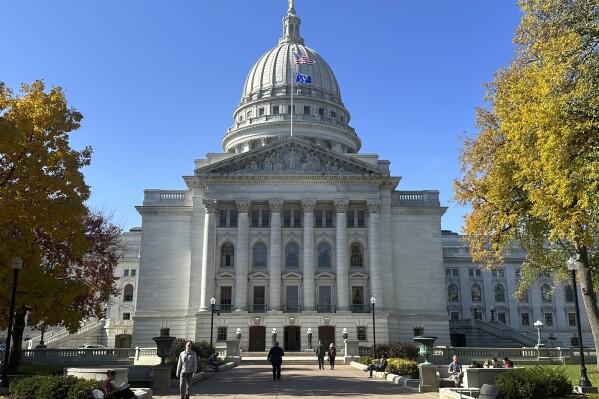A Wisconsin ruling on Catholic Charities raises the bar for religious tax exemptions
MADISON, Wis. (AP) — Exemptions that allow religious organizations to avoid paying Wisconsin’s unemployment tax don’t apply to a Catholic charitable organization because its on-the-ground operations aren’t primarily religious, a divided state Supreme Court ruled Thursday.
The outcome of the case, which drew attention and concern from religious groups around the country, raises the bar for all religions to show that their charity arms deserve such exemptions in the state.
The court ruled 4-3 that the Superior-based Catholic Charities Bureau and its subentities’ motivation to help older, disabled and low-income people stems from Catholic teachings but that its actual work is secular.
“In other words, they offer services that would be the same regardless of the motivation of the provider, a strong indication that the sub-entities do not ‘operate primarily for religious purposes,’” Justice Ann Walsh Bradley wrote for the majority.
Religious groups from around the country filed briefs in the case, including Catholic Conferences in Illinois, Iowa, Michigan and Minnesota, the American Islamic Congress, the Church of Jesus Christ of Latter-day Saints, the International Society for Krishna Consciousness, the Sikh Coalition, and the Jewish Coalition for Religious Liberty.



Eric Rassbach, vice president and senior counsel for the Becket Fund for Religious Liberty, which represented the Catholic Charities Bureau, said the court got the case “dead wrong.”
“CCB is religious, whether Wisconsin recognizes that fact or not,” he said.
The firm did not immediately respond to an email inquiring about the possibility of an appeal to a federal court.
Wisconsin law requires to pay an unemployment tax that is used to fund benefits for workers who lose their jobs. The law exempts religious organizations from the tax.
Every Catholic diocese in Wisconsin has a Catholic Charities entity that serves as that diocese’s social ministry arm.
The Catholic Charities Bureau is the Superior diocese’s entity. The bureau manages nonprofit organizations that run more than 60 programs designed to help older or disabled people, children with special needs, low-income families, and people suffering from disasters, regardless of their religion, according to court documents.
The bureau and four of its subentities have been arguing in court for five years that the religious exemption from the unemployment tax should apply to them because they’re motivated by Catholic teachings that call for helping others.
A state appeals court this past February decided the subentities failed to show that their activities are motivated by religion. Judge Lisa Stark wrote that the subentities’ mission statements call for serving everyone, regardless of their religions.
As for the bureau itself, it has a clear religious motivation but isn’t directly involved in any religiously oriented activities, she wrote. The outcome might have been different, Stark added, if the church actually ran the bureau and its subentities. Their workers would then be considered church employees, she said.
The bureau and the subentities asked the Supreme Court to review that decision. But the court’s four-justice liberal majority upheld the appellate ruling on almost the same rationale.
“The record demonstrates that CCB and the sub-entities, which are organized as separate corporations apart from the church itself, neither attempt to imbue program participants with the Catholic faith nor supply any religious materials to program participants or employees,” Ann Walsh Bradley wrote.
Justice Rebecca Bradley, one of the court’s three conservative justices, began her dissent by quoting a Bible verse that calls for rendering unto God the things that are God’s. She accused the majority of rewriting the exemption statutes to deprive Catholic Charities of the exemption, “rendering unto the state that which the law says belongs to the church.”
“The majority’s misinterpretation also excessively entangles the government in spiritual affairs, requiring courts to determine what religious practices are sufficiently religious under the majority’s unconstitutional test,” Rebecca Bradley wrote. “The majority says secular entities provide charitable services, so such activities aren’t religious at all, even when performed by Catholic Charities.”
Disclaimer: The copyright of this article belongs to the original author. Reposting this article is solely for the purpose of information dissemination and does not constitute any investment advice. If there is any infringement, please contact us immediately. We will make corrections or deletions as necessary. Thank you.







